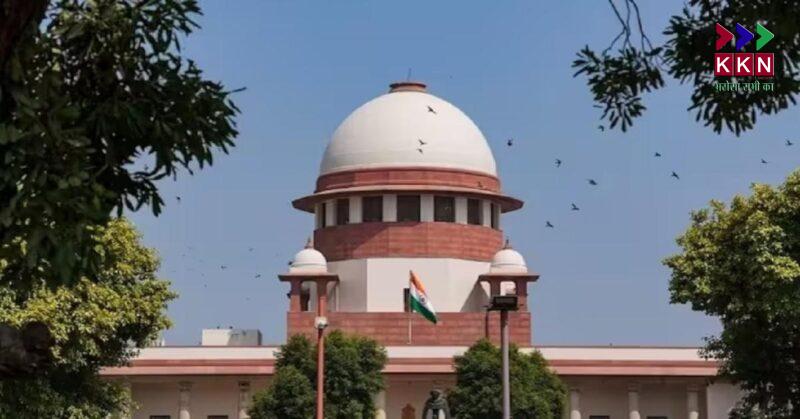KKN Gurugram Desk | The Supreme Court of India is set to hold a critical hearing on the Waqf (Amendment) Act 2025 today, amidst growing nationwide legal and political debate. With over 70 petitions filed challenging the law, and several high-profile political leaders and organizations participating, the case has captured national attention.
Article Contents
A bench led by Chief Justice of India (CJI) Sanjiv Khanna and Justice PV Sanjay Kumar will begin hearing arguments at 2 PM today. Among the 70+ petitions filed, 10 are scheduled for today’s initial hearing, covering both opposition and support for the amended legislation.
This article outlines the legal, political, and social dimensions of the issue, summarizing arguments from both sides and examining the broader implications of the Waqf Amendment Act 2025.
Background: What Is the Waqf Act and Why Was It Amended?
The Waqf Board Amendment Bill 2025 was passed by the Indian Parliament on April 4, 2025, and received Presidential assent on April 5, 2025. The law came into effect on April 8 via official government notification.
The amendment aims to streamline the management of Waqf properties across India and introduce greater accountability. However, critics argue that it infringes upon religious freedoms, particularly of the Muslim community, and violates key constitutional provisions.
Key Legal Issues Raised
Several political leaders, state governments, and civil society organizations have moved the Supreme Court, raising concerns about:
-
Violation of Constitutional Rights: Especially Article 14 (Right to Equality) and Article 25 (Freedom of Religion).
-
Inclusion of Non-Muslims in Waqf Boards: Allegedly diluting the religious character of Waqf administration.
-
Unequal Treatment: Petitioners argue the amended Act reduces protection for Waqf properties while leaving similar properties of other religions untouched.
Who Are the Petitioners?
The petitions being heard today before the CJI Sanjiv Khanna-led bench have been filed by a mix of MPs, MLAs, religious leaders, and legal organizations, including:
-
Asaduddin Owaisi (AIMIM MP)
-
Amanatullah Khan (AAP MLA, Delhi)
-
Association for Protection of Civil Rights (APCR)
-
Jamiat Ulama-e-Hind (led by Arshad Madani)
-
All Kerala Jamiyyathul Ulama
-
Anjum Qadri
-
Tayyab Khan Salmani
-
Mohammad Shafi
-
Mohammad Fazalur Rahim
-
Manoj Kumar Jha (RJD MP)
Core Arguments Against the Waqf Act
1. Unconstitutional and Discriminatory
Many of the petitions argue that the amendment is unconstitutional, specifically under:
-
Article 14 (Right to Equality) – By allowing non-Muslim members on Waqf boards, which historically manage Islamic charitable endowments.
-
Article 26 and 29 – Which protect religious minorities’ rights to manage religious affairs and institutions.
2. Erosion of Protection for Waqf Properties
Asaduddin Owaisi, in his plea, said that the amendment “weakens legal safeguards” for Waqf properties and does not apply similar standards to properties of other religious groups, making it selectively oppressive.
3. No Rational Link to Property Management
AAP MLA Amanatullah Khan has argued that adding non-Muslims to Waqf Boards has no logical connection to the intended goal of better property management, making it arbitrary.
4. Discriminatory Implementation
Several groups argue the law opens the door to biased administrative control, state interference, and dilution of Muslim institutions, potentially setting a precedent for similar actions against other minority groups in the future.
Government’s Defense
In its defense, the Central Government has taken a strong position, stating that the amendment is purely administrative and intended to:
-
Correct large-scale mismanagement of Waqf assets.
-
Ensure transparency and accountability in fund utilization.
-
Provide equitable distribution of benefits to poor Muslims, women, and children.
According to government sources:
-
The amendment is not religious but regulatory in nature.
-
It has been discussed in public forums and reviewed by a Joint Parliamentary Committee.
-
It also enjoys support from non-Muslim minority groups.
State Governments Involved
Seven Indian states have officially supported the amendment by filing petitions in the Supreme Court, asserting that the law is constitutionally valid and should remain in force. These states include:
-
Haryana
-
Madhya Pradesh
-
Maharashtra
-
Rajasthan
-
Chhattisgarh
-
Uttarakhand
-
Assam
These states argue that the Waqf Amendment Act 2025 is essential for curbing corruption, restoring accountability, and strengthening governance mechanisms in Waqf boards.
Nationwide Protests and Violence
Since the introduction of the Bill, several protests have erupted across the country, some of which turned violent:
-
The most violent protest took place in West Bengal, where:
-
Three people lost their lives in clashes.
-
Several homes and businesses were damaged.
-
CM Mamata Banerjee has publicly declared that her state will not implement the amended law.
-
Other demonstrations have occurred in Delhi, Hyderabad, Bhopal, and Lucknow, with participants raising concerns about religious freedom and property rights.
Analysis: What’s at Stake?
✅ For Supporters:
-
Transparent management of Waqf assets.
-
Stronger administrative control.
-
Reduction in misuse of community resources.
❌ For Opponents:
-
Potential state overreach into religious affairs.
-
Loss of community autonomy over religious institutions.
-
Risk of setting a legal precedent affecting other minority boards.
What’s Next?
The Supreme Court’s hearing today is likely to be preliminary, setting the ground for a long legal battle. Given the complexity and volume of petitions (over 70), the matter could be:
-
Transferred to a Constitutional Bench, if deemed necessary.
-
Subjected to interim reliefs, including stay orders on implementation.
-
Possibly referred to legislative review, based on judicial observations.
The Waqf Amendment Act 2025 sits at the intersection of law, religion, and politics in India. As the Supreme Court hears petitions today, the outcome may define not just the future of Waqf property management, but also broader interpretations of minority rights and constitutional freedoms.
KKNLive will continue to track developments from the court, state responses, and community reactions across India. Stay updated for verified, in-depth analysis as the story unfolds.




